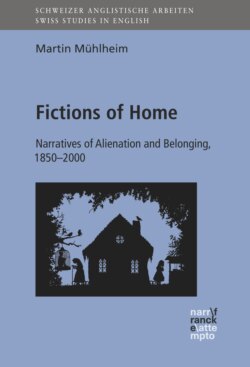Читать книгу Fictions of Home - Martin Mühlheim - Страница 37
На сайте Литреса книга снята с продажи.
3 “The Majesty of EnglandEngland”: The Ethics of Home and the Imperial City in Virginia WoolfWoolf, Virginia’s Mrs. Dalloway
ОглавлениеFor European modernists after 1914, writing about home meant coming to terms with the impact of globalglobal and globalization war.132 Consider, for instance, the novel that many believe to be the period’s greatest achievement: James JoyceJoyce, James’s Ulysses (1922), written abroad and named after a hero who, after a protracted and devastating war, can no longer seem to find his way home. At the same time, though the long nineteenth century had arguably come to a close with the armistice on November 11, 1918 (e.g. OsterhammelOsterhammel, Jürgen 88), to political commentators in the early 1920s the meaning of the historical moment was far less clear than it seems in hindsight. The United KingdomUnited Kingdom, for instance, mourned the deaths of hundreds of thousands in the bloodiest conflictconflict in human history, but the country had also emerged victorious from the war, and the British EmpireEmpire in many respects appeared more unified and powerful a world system than ever (Jeffrey 13; see also North 54). Given this strange commixture of triumph and traumatrauma and shell shock, the profound sense of ambivalenceambivalence that pervades English postwar novels like Mrs. Dalloway (1925) is hardly surprising.
In WoolfWoolf, Virginia’s novel, this sense of ambivalenceambivalence revolves, specifically, around the nature of everydayeveryday life in LondonLondon, the EmpireEmpire’s proud metropolitan center.133 However, the novel’s key question is not, as some critics suggest, whether or not it is possible to feel at home in the modern metropolis (Ellis 76; see also HawthornHawthorn, Jeremy 78; WhitworthWhitworth, Michael 153). Rather, Mrs. Dalloway explores whether, given the state of British society in the 1920s, to feel at home in the capital is morally justifiable. In the previous chapters, we mainly examined the factors that make it more difficult to feel at home for some characters than for others; accordingly, the focus was on the potential obstacles to an individual’s sense of belonging. We have thus not yet asked whether there may be circumstances under which one should not truly want to feel at home because the ethical price for belonging is simply too high. It is this question that we will address in the present chapter.
Part of the discussion will revolve around the way in which WoolfWoolf, Virginia’s novel constructs both geographical and discursive space. We will begin by examining how Mrs. Dalloway reflects and renegotiates English debates about the relative merits of the citycity and the country as sites of home. In particular, the novel dissects the familiarfamiliarity idyllidylls of the English country housecountry house, laying bare some of its ideological limitationslimitations and pitting it against the pulsating and spectacular space of the modern city. At the same time, however, the space of the city also appears as very precisely delimited in WoolfWoolf, Virginia’s novel, at least for those associated with Clarissa Dalloway and her social circle. In part, the novel uses shifting narrative perspectivesnarrative perspective to open up this delimited social space, but even the scope of these narrative shifts has very precise boundaries, depending on the characters with whom they are associated. Ultimately, Mrs. Dalloway confronts us with characters whose discursive space of belonging is every much as confined and contested as their geographical room for maneuver in the city.
In order better to understand the conflicts between these characters, we will therefore have to shift the emphasis from the spatial dimensions of home to what we might call the temporalitytemporality of belonging. In effect, the novel contrasts characters who – for various reasons – gravitate toward a timeless, mythical view of life with those who are more firmly rooted in historical time. The novel’s postwar context is vital here, as the repressionrepression of history has much to do with a desiredesire on the part of Clarissa, in particular, to evade questions of responsibilityresponsibility and social injusticeinjustice. In consequence, Clarissa and others from her circle not only misread the novel’s most tragic figures, Septimus and Lucrezia Warren Smith; they also fail to reflect on the extent to which their own sense of belonging depends on their social position within a political eliteelite that is at least partly responsible for the disasters of the Great War. Importantly, Mrs. Dalloway does not fault these characters for their desire to belong. Rather, the novel emphasizes that their sense of belonging comes at a price, and it encourages us continually to judge whether this ethical price is worth paying. In its wanderings through the imperial citycity, Mrs. Dalloway thus constitutes nothing short of a narrative quest for an ethicsethics of home.
